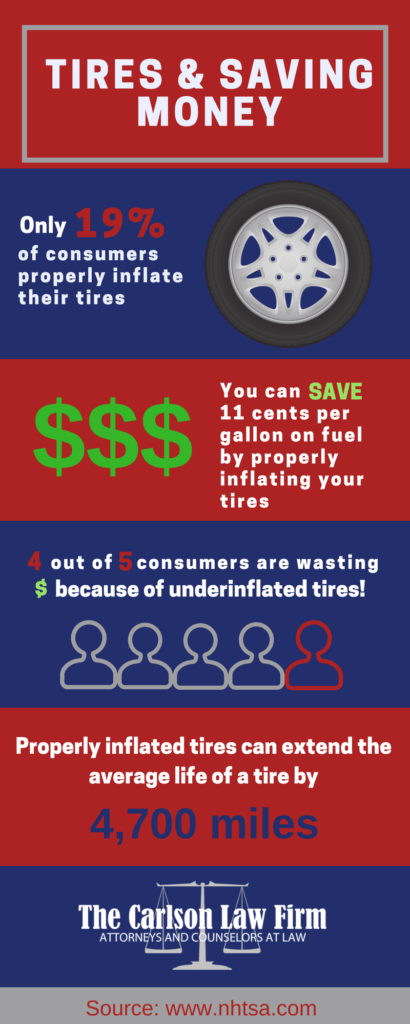When we think of tire failure, we often picture a flat or a blowout. However, many times tire failure is not that obvious. Worn down tread and bulging seams are indicators of a potential disaster. With 11,000 tire-related crashes occurring annually, it is important to understand how your driving habits will influence the lifespan of your tires.
You might be questioning how long tires are supposed to last. While there is not a clear answer, the amount of time you spend driving as well as the type of driving you do will definitely factor into tire maintenance.
Taking off too quickly
If you’re burning rubber every time the light turns green, you are likely to be a regular at the tire shop. That long black streak you leave behind are bits of rubber. Instead of the tread gripping the road to propel your car forward, you are exhausting your tires by having them spin against the asphalt.
Going over curbs
We have all seen it before; the black marks left on curbs from vehicles driving over them. Carefully approach curbs as they are a danger to your tires. If you drive over them suddenly or at a wrong angle, not only will rubber scrape off the tire, the impact can cause the tire to crack
Sudden stops
Make a guideline for yourself while driving. Your guideline should include:
1. Slowing down sooner
2. Allowing plenty of distance to come to a complete stop
When you race toward an intersection only to have to slam on your brakes at a stop sign, you will, again, leave bits of rubber from your tires on the road causing premature wear.
Driving at top speeds
Another reason to slow down is that speeding generates excessive heat, increasing the rate of tire wear. Your tires and your wallet will both thank you if you drive with a lighter foot.
You can check your tires speed rating on the sidewall of the tire itself. It is not wise to exceed those limits or drive close to those limits for long periods of time.
Carrying heavy loads
Keep in mind, just because everything you squeeze into your vehicle fits, doesn’t mean doing so is a good idea. All tires have a rating for maximum weight printed on the sidewall of the tire. Exceeding the maximum weight increases the pressure inside of the tire and weakens the tires. This can make them vulnerable to failure. If carrying heavy loads is a must, consider investing in premium tires that are made to handle the extra weight.
Driving over road debris
It is not uncommon to come across potholes, road kill, loose gravel, broken glass and other obstacles during your travels. However, it is best to avoid any item in the road that may puncture, slice or otherwise pop your tire. Additionally, these road hazards can jolt suspension and steering out of alignment, leading to tire wear. Hitting road debris may lead to uneven tire wear and internal damage that will open the doors to blowouts and costly repairs.
Other factors contributing to tire failure
Tire aging is something to be aware of. Even if your tires are stacked up in the garage, the structural integrity may be weakened over time, regardless of the amount of tread remaining. If you keep your tires stored in the garage for a lengthy amount of time, check them before putting them to use as they may need to be replaced. The National Highway Traffic Safety Administration (NHTSA) recommends checking the owner’s manual for recommendations specific to your vehicle. Some manufacturers suggest replacing tires at least every six years regardless of use.
The following may also affect how long your tires will last:
- Outside temperature
- Inflation pressure
- Frequency of rotation
- Frequently pulling a trailer
- Exposure to ozone or UV rays
- Appropriate pairing of tires on same axle (new opposite new, old opposite old)
- Rating of the tire itself (NHTSA has a tool to check tire ratings)
- Defective tires (keep an eye out for any recalls that may include your specific tires)
The importance of caring for your tires
As demonstrated above, there are a number of factors that can lead to added stress on your tires. If your tire tread has worn down, any combination of rumbling, vibrations, or pulling to one side repeatedly may mean you need your tires serviced. There may also be a loss of traction in water that will cause your vehicle to hydroplane. You may start to notice it takes you longer to brake because of the loss of traction.
Tires are what separate us from the road. If your tires are not in good condition, you may be heading toward a potential catastrophe. The NHTSA reported that tire malfunction contributed to 733 motor vehicle traffic fatalities in 2016. Other injuries associated with tire failure accidents include lacerations, neck injuries, back injuries and more.
By being proactive with your vehicle’s tire maintenance and care you can preserve your tires and reduce your risk of a collision. After all, these tips are also the best driving habits for your safety—which is a top priority.

How The Carlson Law Firm can help
There are times when even the most cared for tires turn out to be defective due to the negligence of a company or manufacturer. If you or a loved one were involved in a tire-related collision causing injuries or death, it is critical you speak to an experienced Tire Defects Lawyer as soon as possible. If we find that defective tires were the cause of the crash, we will make it our mission to help prove liability on the negligent party and fight for maximum compensation on your behalf while you take the necessary time to recover. Contact us today for a free case evaluation. We care, we can help.





